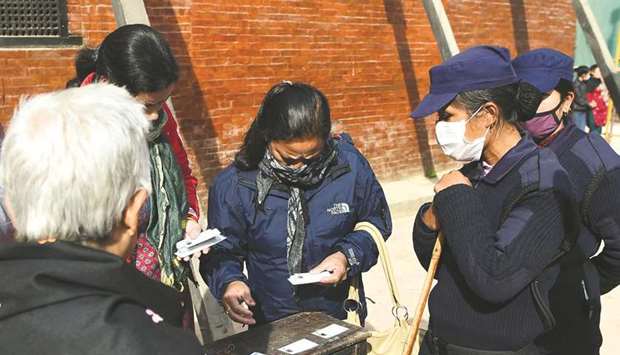In deeply superstitious Nepal, astrologers hold enormous sway in political circles and the seers have been busy ahead of a general election that could herald change after more than two decades of turbulence in the Himalayan nation.
Leaders regularly consult the stars for guidance on a range of matters from the most auspicious moment to hold elections to the challenge posed by a rival, anything that might give them an edge in this hotly-contested poll.
Prime Minister Sher Bahadur Deuba has been in regular contact with his fortune teller ahead of the historic vote, the final step of a drawn-out peace process which began in 2006 with the close end of bloody civil war.
Deuba was told he would be prime minister seven times - he is currently on his fourth term - and boldly claimed his party would win in response to taunts from opposition leader K P Oli.
But Deuba’s Nepali Congress faces a tough challenge in the polls from Oli’s Communist CNP-UML party, which has formed an alliance with the main Maoist party that will be tough to beat.
Deuba’s astrologer, Angiras Neupane, said that according to Deuba’s birth chart - calculated on the date, time and location of his birth - he would serve at least one more term in top
office.
But he said that it wouldn’t necessarily be the next one.
He predicted that Oli would in fact be the next prime minister but that his coalition would quickly crumble, allowing
Deuba to retake the reins.
“There will be instability in the country yet again,” Neupane said at his home in a village on the edge of Kathmandu.
That is hardly welcome news in Nepal, which has endured a tumultuous transition from monarchy to democracy.
In the last 27 years, Nepal has had 26 prime ministers, suffered a brutal Maoist insurgency and ousted an unpopular monarchy. There was also a devastating earthquake in 2015.
It is not only in Nepal where politicians are gripped by seers.
In Sri Lanka, former president Mahinda Rajapakse lavished his astrologer with a house, limousine and chauffeur - until he counselled the strongman to hold the snap election that ended his decade-long hold on power.
Nepal’s Deuba has a reputation for being particularly superstitious - even delaying his move into the prime minister’s house at the start of his latest term in June on the advice of
his seer.
But politicians from all sides consult the stars.
“It is not mandatory for politicians to visit fortune tellers, but every politician does because they want luck to be on their side for every step that they make in their career,” said Raghu Karki, a member of the NC’s student wing.
“Even the Marxist politicians believe in astrology.”
Other politicians contacted by AFP were reluctant to discuss their luck however.
“All kinds of people visit fortune tellers. Common as well as high profile people visit and take my advice. But they don’t want to disclose they’ve visited an astrologer for fear of being thought of as weak,” said fortune teller Ojraj Lohani, who used to
advise Deuba.
Lohani also said Deuba’s astrological chart indicated he would be prime minister once more.
Election officers sort out voter identity cards ahead of the upcoming elections in Kathmandu yesterday. Nepal is gearing up for the second phase of its first national elections under the new constitution on December 7.

